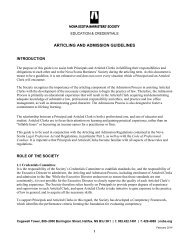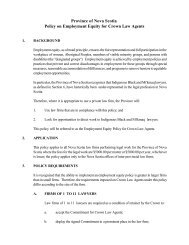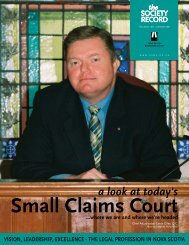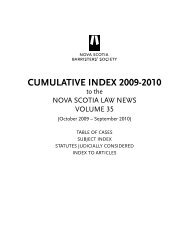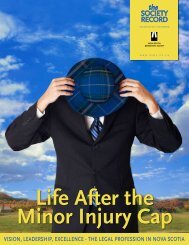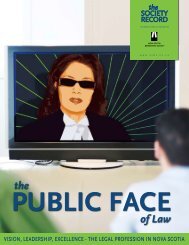SR Vol 27 No 3, July 2009 - Nova Scotia Barristers' Society
SR Vol 27 No 3, July 2009 - Nova Scotia Barristers' Society
SR Vol 27 No 3, July 2009 - Nova Scotia Barristers' Society
You also want an ePaper? Increase the reach of your titles
YUMPU automatically turns print PDFs into web optimized ePapers that Google loves.
Safeguarding the rights of<br />
young people<br />
Local case clarifying police interrogation procedures across Canada<br />
Jennifer Stewart<br />
Freelancer<br />
Legal Aid lawyer had dealt with before.<br />
It wasn’t the first time Shawna<br />
Hoyte had received such a call.<br />
But it would turn out to be a<br />
case like no other the Dalhousie<br />
It was August 2004. The mother of one of Hoyte’s clients had called to<br />
say her 15-year-old son was in custody on a slew of charges, including<br />
dangerous driving causing bodily harm in an alleged hit-and-run in<br />
Dartmouth.<br />
Hoyte knew the boy well. He’d had run-ins with the law before and<br />
suffered from learning disabilities, which often made communication<br />
with the teen difficult.<br />
This time would prove no exception.<br />
Despite his mother’s insistence that her son couldn’t properly<br />
understand what it meant to waive his rights, officers extracted a<br />
90-minute videotaped statement from the teen that was later admitted<br />
as evidence at trial. Hoyte was not present for the interrogation.<br />
“I knew this kid fairly well in a relationship as solicitor-client, and I<br />
knew that he really didn’t get a lot of what was going on,” says Hoyte.<br />
“He was the type of kid that would accept responsibility for things<br />
just to get it done and over with because he didn’t have the intellect<br />
or mentality to keep it going.”<br />
Judge Pam Williams of Halifax Youth Court sensed that same vibe<br />
and tossed the statement out.<br />
“The judge made several comments in that the police have to go one<br />
step further in making certain that a young person clearly understands<br />
what it means to waive their rights,” Hoyte says.<br />
With no other evidence against the boy, the charge was dismissed.<br />
But that wasn’t the end of it.<br />
The Crown took the case to the <strong>No</strong>va <strong>Scotia</strong> Court of Appeal, which<br />
ordered a new trial. Hoyte fired back and applied successfully to have<br />
the case heard by the Supreme Court of Canada.<br />
“There was a question of standard of compliance and proof — was it<br />
22 The <strong>Society</strong> Record



